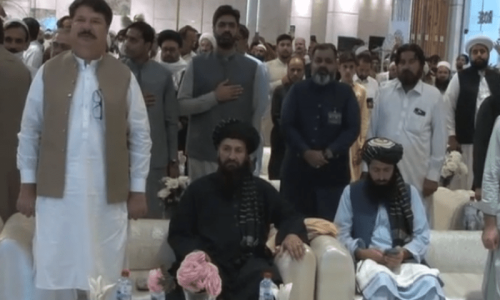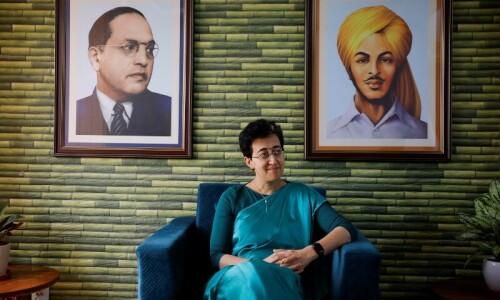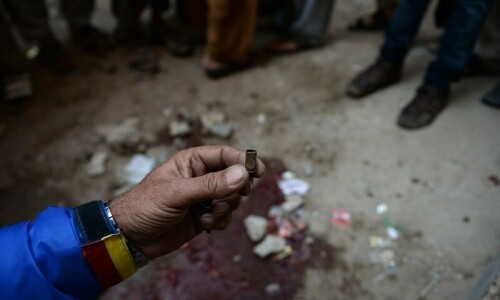BEIJING, April 7: China on Monday condemned demonstrations that disrupted the Olympic torch relay in London, and President of the International Olympic Committee (IOC) Jacques Rogge expressed concern at the protests but said there was no momentum for a Games boycott.
Protesters opposing a security drive in Tibet and demanding the mountain region’s independence turned Sunday’s London leg of the torch’s journey into an obstacle course of angry disruptions — not what China wanted for its “journey of harmony”.
At least 35 people were arrested and the wedge of police guarding the Olympic torch at one point was forced to hustle it on to a double-decker bus to escape about 100 protesters.
Chinese state TV focused on the larger crowds of well-wishers who lined the route and British sports celebrities holding the torch. A later report showed some of the protests, as well as British athletes and residents criticising them.
But an official quoted by the state-run Xinhua news agency was bluntly angry.
“... a tiny number of Tibet independence elements sought to disrupt the relay of the Olympic Games sacred flame through London,” said an unnamed spokesperson of the Beijing Olympic Games torch relay office. “We strongly condemn this vile behaviour.”
Tibet’s capital, Lhasa, was hit last month by Buddhist monks’ protests against Chinese rule which gave way to deadly rioting on March 14, and since then security forces have poured in to reimpose control there and in other restive Tibetan areas.The first group of suspects accused of deadly rioting will soon go on trial in Lhasa, the China News Service reported, citing officials.
Rogge said he was very concerned “with the international situation and what’s happened in Tibet”.
“The torch relay has been targeted. The IOC has expressed serious concerns and calls for rapid, peaceful resolution in Tibet,” he said in a speech to the Association of National Olympic Committees in Beijing.
“Violence for whatever reason is not compatible with the values of the torch relay and the Olympic Games. Some people have played with the idea of boycotts. As I speak today, there is no momentum for a general boycott.”
British IOC member Craig Reedie said he thought there were just a few “isolated flashpoints” among many thousand of people enjoying the torch relay.
“I think people understand that in a democracy, people have the right to protest if that’s what they wish to do,” he said. “There have been many more serious demonstrations in London over other issues.”
The Olympic flame is expected to remain a magnet for anti-Chinese protests ahead of the Games in Beijing, with campaigns aimed at Tibet and also at Sudan.
Chinese officials have accused Tibet’s exiled Buddhist leader, the Dalai Lama, of organising the unrest to press for independence ahead of the Beijing Games in August and have vowed to come down hard on rioters and protesters.
The Dalai Lama has repeatedly denied the accusations and said he wants true autonomy, but not outright independence, for Tibet.
Speaking at a news conference after meeting Premier Wen Jiabao, New Zealand Prime Minister Helen Clark said she had called on China to reopen dialogue with the representatives of the Dalai Lama.
“We do not question to status of Tibet, but that does not mean we cannot be deeply concerned by the violence and rioting,” she said.
The Dalai Lama had said he was against violence, against independence for Tibet and in favour of the Olympics, she said.
“In our view, those three points should clear the way for a dialogue between China and his representatives.”
Human Rights Watch, a New York-based organisation critical of China’s crackdown in Tibet, urged French President Nicolas Sarkozy to use the torch relay event to publicly condemn Olympic-related human rights issues in China.
But responding to US lawmakers’ moves to issue a resolution criticising Beijing’s policies in Tibet, a Chinese government spokeswoman said it was the rioters and the Dalai Lama’s followers who deserved censure.
“To point the spear at the Chinese government and people is to completely confuse black and white,” Foreign Ministry spokeswoman Jiang Yu said, according to Xinhua.
Meanwhile, in Australia a government official said the route of the Olympic torch relay through Canberra on April 24 has been changed due to security concerns.
“Yes, the route has been reviewed, adjustments have been made,” Australian Capital Territory chief minister John Stanhope said. He did not elaborate.
Stanhope was replying to a question from Australia’s Seven television network, which also reported that China had asked that the Australian leg through Canberra be shortened.
—Agencies













































Dear visitor, the comments section is undergoing an overhaul and will return soon.